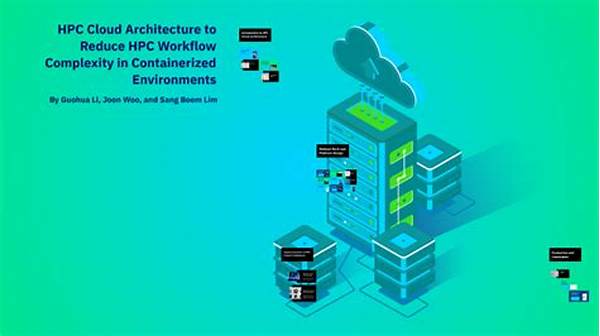In high-performance computing (HPC) environments, data serves as the lifeblood of operations. With the increasing reliance on vast computational resources for research and industrial tasks, ensuring data integrity and preventing loss becomes a priority. Yet, the complexity and scale of HPC systems inherently introduce risks. The consequences of data loss can be severe, impacting productivity, research outcomes, and operational efficiency. Therefore, adopting comprehensive strategies tailored to the unique challenges of HPC environments is crucial. This article delves into practical approaches for reducing data loss in HPC environments, offering insights into mitigation strategies that can help safeguard valuable information.
Read Now : Reasonably Priced Laptops For Coding Projects
Understanding the Risks in HPC Data Management
In the realm of high-performance computing, understanding the risks associated with data management is imperative for reducing data loss in HPC environments. HPC systems are characterized by their complexity, involving numerous interconnected components that can be prone to failures. Hardware malfunctions, software bugs, and human errors are just a few of the potential pitfalls. Furthermore, the vast volumes of data processed in HPC tasks require robust management policies to prevent inadvertent data deletion or corruption. Regular updates, continuous monitoring, and implementing redundancy measures such as backups are essential steps. Another significant risk is cyber threats, which can silently corrupt or steal data, making cybersecurity measures indispensable.
Keeping these factors in mind, organizations must devise strategies that align with their operational goals yet are flexible enough to accommodate advancements in technology. Commitment to staff training, adoption of the latest security protocols, and investment in quality hardware can significantly contribute to reducing data loss in HPC environments.
Finally, evaluating past incidences of data loss can provide valuable lessons. By examining previous failures, HPC operators can identify patterns and refine their data management strategies, adapting them to prevent future mishaps. When proactive measures and reactive analyses are combined, the likelihood of data loss is minimized, translating to more reliable and efficient HPC operations.
Key Strategies for Reducing Data Loss
1. Regular Backups: Systematic and routine backups form the cornerstone of reducing data loss in HPC environments, ensuring that data can be recovered in case of an unexpected event.
2. Use of Redundancy: Implementing redundant arrays and distributing data across multiple nodes can enhance data availability and protect against localized hardware failures.
3. Cybersecurity Measures: Strengthening network defenses with firewalls, encryption, and regular security audits can protect sensitive data from cyber threats.
4. Staff Training: Educating staff on best practices and emerging threats equips them with the knowledge to prevent human errors and recognize potential security issues.
5. Hardware Maintenance: Regular checks and timely updates of hardware components are vital in reducing data loss in HPC environments by preventing unforeseen breakdowns.
The Role of Technology in Mitigation
Technology plays a pivotal role in reducing data loss in HPC environments. Innovations in data storage solutions, such as distributed file systems and cloud-based backups, provide robust mechanisms to secure data. These technologies allow for seamless scaling and adaptability to growing data needs, ensuring stability and reliability. Moreover, advanced monitoring tools equipped with artificial intelligence can predict potential failures before they occur, offering preemptive solutions to maintain data integrity.
Another noteworthy advancement is the integration of blockchain technology for data verification. By employing a decentralized ledger system, data integrity is continuously validated, and unauthorized alterations become difficult. This method boosts confidence in the accuracy of stored information. Furthermore, the rise of automated recovery systems, capable of quickly resurrecting data post-failure, exemplifies technology’s role in safeguarding information.
However, the adoption of new technologies should be approached with caution. Organizations must evaluate the compatibility of such innovations with their existing infrastructure to prevent unnecessary disruptions. By carefully selecting and integrating these technologies, HPC environments can effectively reduce the risk of data loss, ensuring that information remains secure and accessible.
Practical Insights for Implementation
1. Evaluate Current Infrastructure: Organizations must first assess their current systems to identify vulnerabilities that could lead to data loss.
2. Pilot Testing: Before full implementation, conducting pilot programs can allow for adjustments without risking the entire data ecosystem.
3. Policy Development: Establish comprehensive data management policies that encompass best practices for reducing data loss in HPC environments.
4. Vendor Partnerships: Collaborating with reliable vendors offers access to expert solutions and cutting-edge technology.
Read Now : Wireless Professional Gaming Headset
5. Continuous Improvement: Regularly updating strategies, technologies, and staff skills keeps the organization prepared for emerging challenges.
6. Data Prioritization: Not all data is equal in value. Prioritizing critical data helps focus efforts and resources where they matter most.
7. Incident Response Plans: Developing and rehearsing incident response plans ensures readiness to address data loss swiftly.
8. Feedback Mechanisms: Create channels for feedback from staff to continuously refine and enhance data management policies.
9. Transparent Reporting: Encourage transparency in reporting data loss incidents to foster a culture of accountability and improvement.
10. Legal Compliance: Ensure all data management practices adhere to applicable legal and regulatory standards.
Moving Towards a Secure Future
As organizations increasingly rely on HPC environments for critical operations, the need for effective strategies to reduce data loss becomes imperative. From policy-making to deploying technology innovations, the pathway to securing data is multifaceted. Achieving a secure HPC environment requires collaboration across departments, leveraging interdisciplinary insights to develop comprehensive protection strategies. By understanding both the technological and human aspects of data management, organizations can create a robust defense against potential data loss.
The synergy achieved by integrating state-of-the-art technologies with diligent organizational practices ensures a resilient HPC environment. However, this balance requires ongoing commitment and adaptability. With the ever-evolving landscape of threats and advancements, being proactive rather than reactive becomes crucial. Strategic foresight and planning are indispensable in maintaining data integrity and protecting against loss, ensuring that HPC systems remain productive and valuable.
While the challenges are considerable, they also present opportunities for growth and innovation. By fostering a culture that values data protection, organizations can not only safeguard their assets but also enhance their reputation in the industry. A proactive stance on reducing data loss in HPC environments signals readiness to embrace the future with confidence and resilience.
Reflecting on Best Practices
In conclusion, reducing data loss in high-performance computing environments necessitates a multifaceted approach. By drawing on both technological advancements and human-centric policies, organizations can forge a path toward enhanced data security. It is crucial to recognize that data management requires continuous refinement, driven by feedback and evolving best practices. This adaptability will ensure that HPC environments remain robust in the face of challenges.
Organizations must remain vigilant and committed to continual improvement in their data management strategies to effectively reduce data loss in HPC environments. Engaging in open dialogues about data security and staying abreast of technological developments are key. A collective effort within the organization, combined with strategic external partnerships, enables the creation of a resilient infrastructure. This fusion of technology and human effort safeguards data, enhances organizational efficiency, and maintains trust in HPC systems.
A Strategic Overview
Reducing data loss in HPC environments is a complex challenge requiring a strategic balance of technology, policy, and human resources. The growing sophistication of computational tasks demands robust data management frameworks capable of adapting to new threats and opportunities. As we transition to an increasingly digital and interconnected world, the importance of safeguarding data becomes ever more pronounced. The risks associated with data loss are not only operational but also reputational, affecting credibility and standing.
Organizations are urged to invest in state-of-the-art technologies and cultivate a workplace culture emphasizing the critical nature of data protection. Ultimately, the objective is to create an ecosystem where data flows seamlessly, securely, and efficiently, irrespective of disruptions. By aligning technology with mindful policy-making and fostering a culture of continuous learning, we can significantly reduce data loss in HPC environments, ensuring their long-term viability and success.





